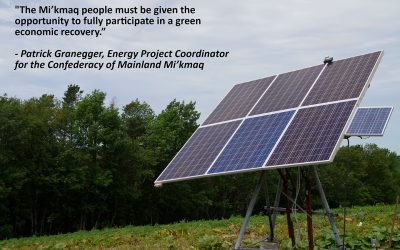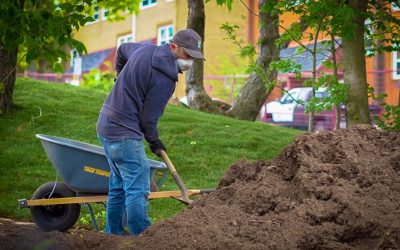Financing home energy projects can be very expensive and presents a barrier to green solutions. Property Assessed Clean Energy (PACE) programs help homeowners make good environmental choices that actually saves them money. Sean Kelly, Director at Clean, writes about Nova Scotia’s leadership in this field and shares opportunities that can help you protect your home investment.
“You could feel the air coming in through the windows and up from the basement.”
It’s a common refrain from countless Nova Scotians living through another cold and long winter. Many of our homes are poorly insulated, and some are barely insulated at all. Blake McDonald of Bridgewater would often see ice on the inside of his windows. His family’s 19th-century farmhouse certainly had character, but not a lot else in the walls.
 A happy customer: Blake McDonald kneels in the basement of his home surrounded by new insulation and energy efficient equipment
A happy customer: Blake McDonald kneels in the basement of his home surrounded by new insulation and energy efficient equipment
“We were drawn to the house because of its history and location,” says Blake, “and we knew it would be cold. But even with some electric space heaters, we went through three tanks of oil between mid-October and the end of December. These were our first cold months in the house, and it was going to get worse.”
Like many of us, this Nova Scotian homeowner wanted to insulate and draft-proof, add a heat-pump and, maybe someday, install some solar panels. That is, he wanted to reduce his energy usage, and make the energy he uses cleaner.
And that’s what we must do as a province. We need to simultaneously change the way we produce energy and the way we use it on an unprecedented scale. This means more renewable energy production, and more energy efficiency.
According to the International Energy Agency, energy efficiency needs to deliver over 40 percent of the greenhouse gas emissions reductions to reach the goals of the Paris Agreement on Climate. A 3% annual improvement in energy efficiency is the rate required to meet those climate goals.
 Sustainable development in Nova Scotia will require dramatic shifts in how we source and secure our home energy. Nature and biodiversity depends on the choices we make now.
Sustainable development in Nova Scotia will require dramatic shifts in how we source and secure our home energy. Nature and biodiversity depends on the choices we make now.
The good news is that this is entirely achievable using existing cost-effective technologies. The bad news is that the world is not on track. Global energy efficiency progress has been slowing since 2015, and in 2018 it improved by only 1.3%.
The first step is that homeowners and businesses must reduce their energy usage through both energy efficiency investments and behavior changes. That’s why you often hear ‘energy efficiency first’… you want to encourage people to use energy wisely before you invest in new capital-intensive renewable energy facilities.
The Clean Foundation is one of many environmental organizations calling for widespread investment in deep energy efficiency retrofits for homes, apartment buildings and commercial buildings. Not only does energy efficiency create good jobs and reduce our greenhouse gas emissions, it saves money on energy bills year after year.
Nova Scotia has long worked to be a leader in energy efficiency, and we are home to Canada’s first energy efficiency utility. Efficiency is considered a ‘fuel’ that can be cheaper to save than new energy is to produce.
Most efficiency programs in Nova Scotia – and indeed in Canada – are centred around rebates of some kind. There are, however, free programs that have social not just environmental goals and try to address energy poverty. Nova Scotia has HomeWarming, run by Efficiency Nova Scotia and Clean Foundation, and funded by the provincial government and Nova Scotia Power. We’d love to see even more investment in programs like HomeWarming.
But for homeowners not eligible for free programs, energy efficiency retrofits or the installation of solar panels can be a challenge for a number of key reasons:
- They don’t know enough about their energy consumption;
- They don’t know what the most cost-effective clean energy measures are;
- They don’t know who to trust or talk to; and, importantly,
- They have trouble getting the necessary capital and money upfront
Rebates are great, but if you don’t have the money upfront to do the retrofits, the buck will stop – or in this case, not start – there. That’s why we need to explore innovative financing schemes to reach the massive numbers of home efficiency retrofits and solar installations we need to see deep progress on our climate goals.
Luckily, Nova Scotia is a national leader in an innovative financing approach called PACE – Property Assessed Clean Energy.
 Here at Clean, we administer the Clean Energy Financing Program with seven municipalities across the province.
Here at Clean, we administer the Clean Energy Financing Program with seven municipalities across the province.
In most PACE programs in Canada, the municipality pays for the efficiency retrofits and solar installations upfront. The debt is then attached to the building and not the owner, and the low-interest repayments are made through a local property tax account or other mechanism. Such a program provides two main advantages: a lower default risk and easier payment collection. If a business or a homeowner sells their building, the project payments are carried on to the next owner. But so are the benefits.
The key to a good PACE program is it does the analysis to figure out how the homeowner can save as much or even more in energy and heating expenses than the costs of the retrofits (over a certain period of time, say 10 or 15 years). Done well, the investment pays for itself. Some PACE programs are focused on solar energy production, and others offer a broad suite of energy efficiency measures.
Why do we say Nova Scotia a leader in PACE? Our province had the first program of its kind in Canada, and we have more municipalities offering PACE than any other province:
- HRM’s SolarCity is the first PACE program (and largest) in the province, and the first of its kind in Canada. It started to help homeowners finance solar hot water heating systems but has expanded to include solar hot air, solar hot water, and solar PV electric.
- Clean Energy Financing was created by Clean Foundation and four forward-thinking municipalities – Bridgewater and the Municipalities of Lunenburg, Digby and Shelburne. This turn-key PACE program currently operates in the Towns of Bridgewater and Amherst, and the Municipalities of Digby, Lunenburg, Barrington, Yarmouth and Cumberland.
- SolarColchester helps property owners in Colchester County install solar photovoltaic panels and harvest clean energy from sunlight – and save money on their power bills while reducing their carbon footprint.
- The Berwick Green Energy Program is empowering homeowners and businesses to perform affordable energy efficient upgrades to their properties with no upfront costs, while supporting local products and services. This program offered the first commercial energy upgrades in Canada using PACE-style financing.
And Nova Scotia has been lucky that the provincial government has been very supportive of PACE, amending laws as needed and offering start-up support.
For homeowners like Blake, the PACE approach just made sense. “By paying back the loan on a monthly basis, it makes it much more manageable, budget-wise. And because of the program, we were able to get cellulose insulation blown into our attic, which is a pretty big space, and spray foam in the basement. We also had some windows replaced, because drafts were a big problem.”
Putting the kettle on for tea in his family’s inviting and now much warmer kitchen, Blake says their home is so much more comfortable. “And we went down from three tanks of oil in two-and-a-half months to just half-a-tank in a month-and-a-half. It’s had an immediate, positive impact on our finances. It’s been dramatic.”



